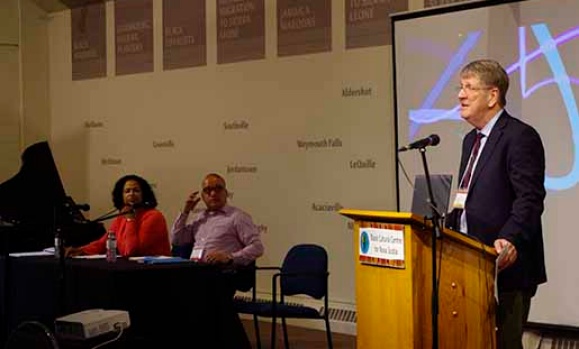News
» Go to news mainJudges look to broaden their perspective by engaging African Nova Scotian community leaders

Judges from all of the Nova Scotia Courts spent two days in early June listening and learning from legal experts and community leaders about the challenges facing the African Nova Scotian community, particularly in the context of the justice system. The panellists included Schulich School of Law Professor Michelle Williams, the director of the Indigenous Blacks & Mi'kmaq Initiative, and IB&M alumni Alisha Brown-Fagan (JD '12), Alexander Mackillop (JD '15), and David Curry Jr. (LLB '09).
The engagement session, held at the Black Cultural Centre in Cherry Brook, was also an opportunity for African Nova Scotian community leaders to gain a greater understanding of the legal system and the roles and responsibilities of the judiciary.
“This type of engagement between members of the judiciary and the African Nova Scotian community is a first in Nova Scotia and probably in Canada," says Williams. "It was a positive experience of mutual respect and immersion in African Nova Scotian culture, reflecting our distinctiveness as a people in this province. There was a strong desire to build on our success and consider other access to justice issues in the future, such as education, environmental racism, health, and land issues.”
It was a positive experience of mutual respect and immersion in African Nova Scotian culture, reflecting our distinctiveness as a people in this province. — Professor Michelle Williams
The idea to meet with the African Nova Scotian community emerged from earlier sessions between the judiciary and First Nations leaders. Those meetings focused on the challenges facing the Indigenous community, particularly the issue of child protection.
The journey to becoming better judges
To plan the program for this conference, African Nova Scotian community leaders from across the province were asked to identify what they think are the most pressing legal issues currently facing their communities.
“This is another step to help us become better judges,” said Nova Scotia Chief Justie Michael MacDonald (LLB '78). “We all carry with us lived experiences that shape who we are and what we believe, and those experiences help guide the decisions we make. But it is important that we also take time to better understand the world view of those who turn to us for relief, particularly when those individuals come from a background different than our own.”
“We have a real opportunity here to challenge the existing narrative, including how the justice system in this province treats African Nova Scotians,” Karen Hudson, president of the Black Educators Association and a member of Schulich Law's IB&M Advisory Council, said after attending the conference. “Judges are at the very top of that system; it is important they hear directly from community leaders about the racism we encounter daily and the stereotypes affecting our community. But it’s also important they hear our ideas on how to move from the negative stories to the more positive ones. That’s been a big part of the discussions this week.”
We have a real opportunity here to challenge the existing narrative, including how the justice system in this province treats African Nova Scotians. — Karen Hudson, Black Educators Association president
The two-day program began with a session for judges only, led by Kimberly Papillon, Esq., an internationally recognized expert on medical, legal and judicial decision-making. Papillon focused on how emerging research in neuroscience can help decision-makers better understand the effects unconscious processes can have on legal decision-making.
Other sessions engaged both judges and community leaders and looked at African Nova Scotian history and related contemporary legal issues, the distinct cultural context and needs of African Nova Scotian families and children, and the unique concerns that can arise when working with African Nova Scotians in the criminal justice system.
The judges also took part in a guided bus tour of African Nova Scotian communities. They visited the African Nova Scotian communities of Africville, Lake Loon, Cherry Brook, East Preston, and North Preston.
MacDonald has made access to justice for African Nova Scotians a priority, in part because of his work as co-chair of the province’s Access to Justice Coordinating Committee. “This work is too important for it to end here,” he noted in his closing remarks. “That is why I will establish a committee to oversee African Nova Scotian community engagement for the entire judiciary and to carry out the next steps we have identified here.”
Recent News
- The Schulich School of Law ft in "Top 10 Law Schools in Canada in 2024"
- Professor Emeritus Wayne MacKay ft in "'Enough is enough': N.S. Teachers Union prepared to strike if no progress on 'priority areas'"
- Professor Emeritus Wayne MacKay ft in "Livestreamed transphobic assault in Hamilton shows why Canada must be tougher on hate, expert says"
- Assistant Professor Suzie Dunn ft in "'Ground is shifting' for social media giants, says federal justice minister pushing Online Harms Act"
- Professor Emeritus Wayne MacKay ft in "Maritime Noon Phone‑In: Three experts discuss and answer questions about proposed legislation in NB called the Compassionate Intervention Act"
- Professor Emeritus Wayne MacKay ft in "Social media giants face scrutiny for cyberbullying. How does this affect Islanders?"
- The Schulich School of Law ft in "The Best Law Schools In Canada 2024"
- Professor Emeritus Wayne MacKay ft in "The Todd Veinotte Show, April 4, 2024"
